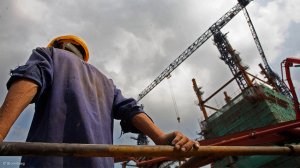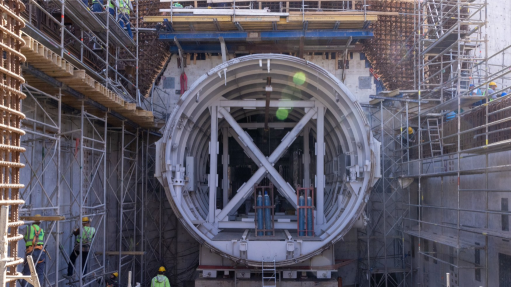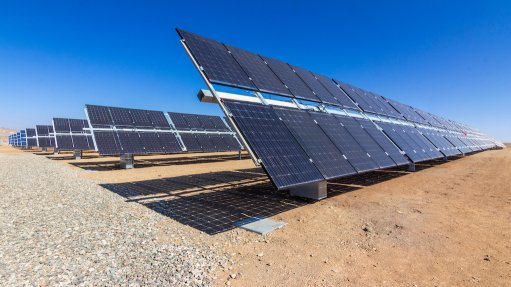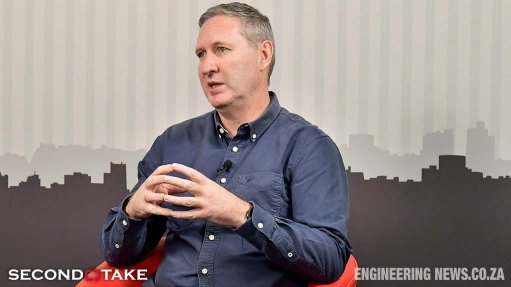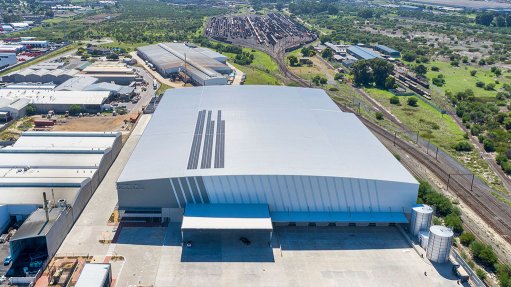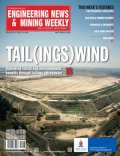Lack of funding appetite for infrastructure projects in PFS stage, forum hears

Knight Piesold MD Leon Furstenburg laments the lack of funding for early-stage projects
Infrastructure delivery in South Africa remains hobbled, not by a lack of project pipeline but rather by a lack of investment appetite for projects that have not yet been proved at the bankable feasibility stage, the Captains of Construction Leadership forum heard on Wednesday.
“We are sitting with a myriad of projects that can’t reach bankable phase because banks want the feasibility to first be proven before investing. It’s sad to hear banks say there is a lot of funding around [and yet] we [seem to] have lost the value of planning.
“There is lots of money available for [investment in infrastructure] projects, but people won’t spend money on planning… projects get tied up in funding arrangements and politics and nonsense. We need to unlock the small capital required in the planning phase,” engineering consultancy Knight Piesold MD Leon Furstenburg told delegates at the forum, which was held on the sidelines of the African Infrastructure Forum, in Sandton.
Forum moderator and political commentator Max du Preez added that, while in countries such as the UK, funders were open to “gambling” with funds in a project’s preparatory and prefeasibility phase (PFS), this was not the case domestically.
“[Institutions such as] the Development Bank of Southern Africa (DBSA) could be better at syndicating to get projects off the ground…[but] we need to get our act together [as the public and private sector].
“The National Development Plan is like a ghost that we hear rumours about but never see anymore…[but] it’s no use just pointing fingers at government, we need to engage,” he commented.
Construction major Basil Read CEO Neville Nicolau added that, while the country was “desperate” for intensified infrastructure build, there was a disconnect between government, labour and the construction industry that was stalling the progress of projects required to meet the country’s energy, transport and public service needs.
Noting that the local construction industry was at the bottom of a cycle, which was pushing firms to project opportunities north of the border, he asserted that all parties involved in infrastructure development were looking to each other to solve the inherent crises of the sector.
“Government doesn’t trust the formal construction sector, and the companies view themselves as having transformed [in accordance with] the required codes, but the emerging sector looks at this and doesn’t think they have part of the action… it’s time we put the ingredients together,” he said.
Nicolau further urged government to move beyond its mistrust of the construction industry that had emerged in response to findings of collusion by the country’s largest construction companies.
“From the industry’s point of view, it’s time that we put the collusion matter aside, it was tens of projects in the thousands of projects completed. We’ve admitted our guilt, we’ve paid our fines and it’s now time that we move forward,” he appealed.
Infrastructure project development was, meanwhile, further hampered by a lack of coordination between companies, government and individuals, all of which appeared to plan and develop in silos, Furstenburg noted.
DBSA head Mo Shaik emphasised during an earlier presentation on Wednesday that the goal of infrastructure delivery on the continent should be to drive regional integration and economic development, but cited strategic planning, political will and the implementation capabilities of governments as key success factors.
To mitigate development risks in Africa, joint action from public and private partners was required, he added.
“The future of South Africa depends on its ability to integrate with the rest of the region. There is no shortage of [development] capital, but there are challenges getting projects to bankable feasibility,” remarked Shaik.
According to the former South African secret service head, projects in Africa failed largely as a result of insufficient equity, a low risk appetite by banks, underdeveloped capital markets, a lack of regulatory frameworks, the poor selection of projects, the absence of a rigorous appraisal process and malfunctioning institutions.
Despite these challenges, the infrastructure investment opportunity in Africa was estimated at around $100-billion a year, with demand outstripping supply.
Moreover, between 2004 and 2012, infrastructure financing had tripled, with 65% of overall project financing sourced from African governments, he asserted.
Comments
Press Office
Announcements
What's On
Subscribe to improve your user experience...
Option 1 (equivalent of R125 a month):
Receive a weekly copy of Creamer Media's Engineering News & Mining Weekly magazine
(print copy for those in South Africa and e-magazine for those outside of South Africa)
Receive daily email newsletters
Access to full search results
Access archive of magazine back copies
Access to Projects in Progress
Access to ONE Research Report of your choice in PDF format
Option 2 (equivalent of R375 a month):
All benefits from Option 1
PLUS
Access to Creamer Media's Research Channel Africa for ALL Research Reports, in PDF format, on various industrial and mining sectors
including Electricity; Water; Energy Transition; Hydrogen; Roads, Rail and Ports; Coal; Gold; Platinum; Battery Metals; etc.
Already a subscriber?
Forgotten your password?
Receive weekly copy of Creamer Media's Engineering News & Mining Weekly magazine (print copy for those in South Africa and e-magazine for those outside of South Africa)
➕
Recieve daily email newsletters
➕
Access to full search results
➕
Access archive of magazine back copies
➕
Access to Projects in Progress
➕
Access to ONE Research Report of your choice in PDF format
RESEARCH CHANNEL AFRICA
R4500 (equivalent of R375 a month)
SUBSCRIBEAll benefits from Option 1
➕
Access to Creamer Media's Research Channel Africa for ALL Research Reports on various industrial and mining sectors, in PDF format, including on:
Electricity
➕
Water
➕
Energy Transition
➕
Hydrogen
➕
Roads, Rail and Ports
➕
Coal
➕
Gold
➕
Platinum
➕
Battery Metals
➕
etc.
Receive all benefits from Option 1 or Option 2 delivered to numerous people at your company
➕
Multiple User names and Passwords for simultaneous log-ins
➕
Intranet integration access to all in your organisation


